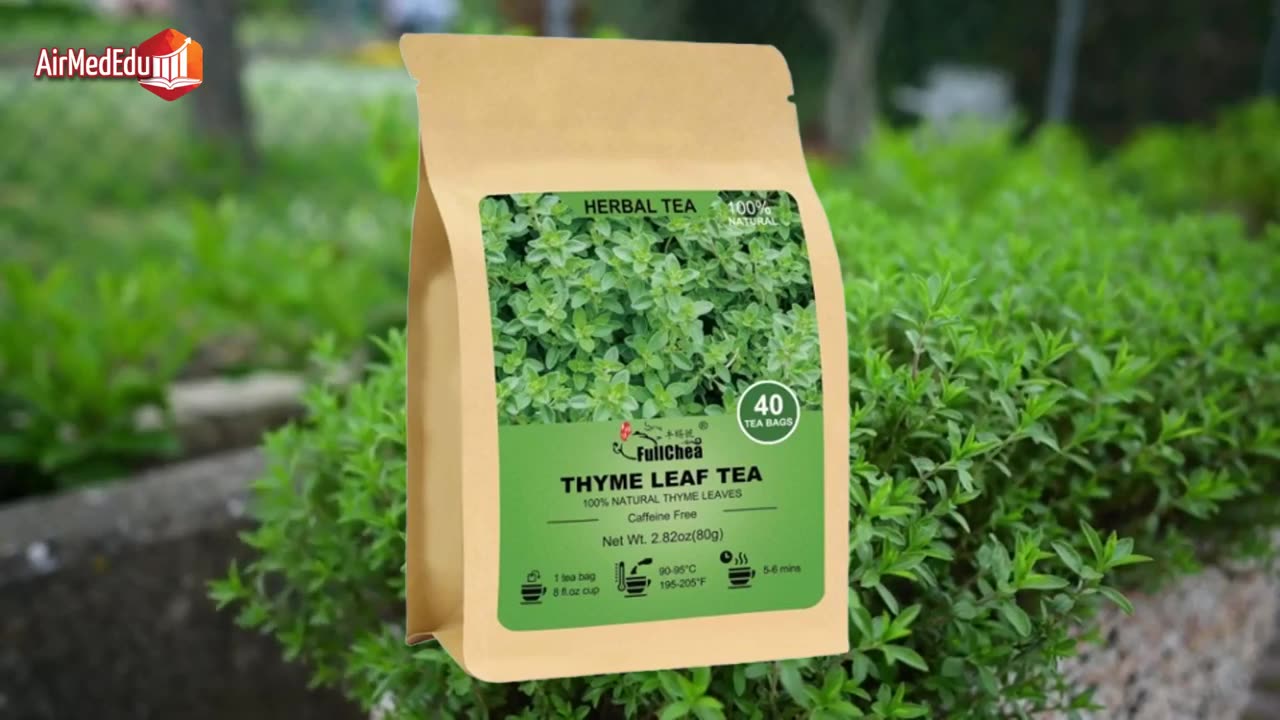Premium Only Content

Effect of Thyme Tea on Specific Organs
Thyme tea, made from the dried leaves and flowers of the Thymus vulgaris plant, has been prized for centuries in various Mediterranean cultures for its aromatic and medicinal properties. Originating in regions such as Europe and North Africa, where it grows wild in rocky, sunny soils, this infusion not only adds a herbal and slightly spicy note to hot drinks but is also noted for its ability to positively influence various systems of the human body, thanks to active compounds such as thymol and carvacrol, which act as potent antioxidants and antimicrobials. With regular consumption, many people experience a noticeable improvement in their overall well-being, especially in key organs such as the lungs, where the tea helps relieve congestion and facilitates the expulsion of accumulated mucus during common respiratory infections.
In the context of the respiratory tract, thyme tea exerts an expectorant effect that promotes the elimination of phlegm from the bronchial tubes, reducing lung irritation and facilitating smoother breathing, which is particularly beneficial for those suffering from bronchitis or mild asthma. This effect extends to relieving dry, irritating coughs, soothing inflamed mucous membranes in the throat and lungs, allowing for a more restful night's sleep without constant interruptions due to coughing fits. Furthermore, its antiseptic properties fight bacteria and viruses that affect the upper respiratory tract, strengthening the lungs' natural barrier against seasonal pathogens such as those that cause the flu, which contributes to a faster recovery from colds and flu that compromise lung function.
Turning to the digestive system, thyme tea acts as a natural ally for the stomach, relieving indigestion by stimulating the production of digestive enzymes that break down food more efficiently, preventing the feeling of heaviness after heavy meals. In the intestines, its phenolic compounds reduce inflammation of the intestinal walls, helping to soothe episodes of diarrhea by regulating intestinal transit and absorbing excess fluids, promoting a balanced bacterial flora. This anti-inflammatory effect also manifests itself in preventing gas and colic, calming spasms in the gastrointestinal tract, and improving the absorption of essential nutrients for maintaining overall intestinal health.
The liver, as the primary purifying organ, benefits from the antioxidant qualities of thyme tea, which protect liver cells from oxidative damage caused by environmental or dietary toxins, thus supporting their detoxifying function and preventing buildup that could lead to chronic inflammation. Regarding the kidneys, its mild diuretic action stimulates the elimination of retained fluids and salts, reducing the burden on these organs and helping to prevent urinary tract infections by maintaining a constant flow that carries away potential bacteria. This process also contributes to regulating blood pressure, since eliminating excess sodium relieves tension in the blood vessels connected to the kidneys, promoting more balanced circulation.
In the heart and cardiovascular system, thyme tea plays a preventive role by modulating blood cholesterol levels, reducing the oxidation of low-density lipoproteins that could clog coronary arteries, thereby decreasing the risk of heart diseases such as atherosclerosis. Its vasodilatory effects relax arterial walls, improving blood flow to the myocardium and stabilizing heart rate in situations of moderate stress, thus protecting the heart muscle from unnecessary overload. Furthermore, by naturally influencing blood clotting, it prevents the formation of clots that could affect the heart's efficient pumping, contributing to overall cardiovascular health.
The skin, as the largest organ in the body, responds favorably to thyme tea thanks to its antibacterial properties, which combat acne by reducing bacterial growth in the pores, calming inflammation in the dermis, and promoting a clearer, more even complexion. In cases of minor wounds, it accelerates healing by stimulating cell regeneration in the epidermis, minimizing scarring and preventing secondary infections that could compromise the skin barrier. This benefit extends to conditions such as eczema or dermatitis, where its anti-inflammatory action soothes redness and itching on the skin's surface, restoring its natural balance without further irritation.
In the reproductive sphere, particularly in the uterus, thyme tea relieves menstrual cramps by relaxing uterine muscles and reducing spasms during the cycle, improving comfort in women with dysmenorrhea and regulating irregular flow without drastically altering hormonal balance. For the immune system in general, which involves organs such as the spleen and lymph nodes, it strengthens defenses by increasing the production of white blood cells, preparing them to fight foreign invaders and reducing the incidence of recurrent infections in multiple systems. Its richness in vitamins C and A nourishes these lymphatic organs, optimizing their adaptive response and preventing deficiencies that weaken overall immunity.
The small and large intestines benefit from thyme tea's ability to prevent intestinal parasites, as its volatile compounds create a hostile environment for helminths and protozoa, expelling them naturally and maintaining the integrity of the intestinal mucosa. This also translates into better absorption of iron and other minerals, benefiting the liver in its storage and distribution role, and preventing anemias that affect tissue oxygenation in vital organs such as the brain. In the brain itself, albeit indirectly, tea promotes a calming effect that reduces oxidative stress in neurons, improving concentration and preventing headaches associated with vascular tension in the skull.
The pancreas, involved in glycemic regulation, may experience stabilization thanks to the antioxidants that protect its beta cells from damage, although this effect is more preventative than curative in the context of incipient diabetes. In the mouth and gums, it acts as a natural mouthwash that maintains oral health by eliminating bacteria that cause cavities and gingivitis, strengthening tooth enamel, and reducing inflammation in the oral mucosa. For the prostate in men, its anti-inflammatory properties may alleviate mild swelling, although always under medical supervision, preventing complications in the lower urinary tract connected to the kidneys.
In preliminary studies, thyme tea has been shown to help fight cancer cells in organs such as the breast, where it inhibits tumor growth by interfering with cell proliferation pathways, protecting breast tissue from oxidative mutations. Similarly, in the intestine, it reduces the risk of colorectal cancer by neutralizing free radicals that damage DNA in epithelial cells, promoting healthy regeneration. In the cervix, its compounds act as modulators that prevent viral infections that can lead to cancer, strengthening the cervical mucosa and supporting local immunity in the female reproductive system.
Continuing with the liver, beyond detoxification, the tea supports bile synthesis, optimizing fat digestion and relieving burdens on the gallbladder, an accessory organ that benefits from fluid bile flow to prevent stones. In the lungs, it is not only an expectorant but also an antispasmodic, relaxing bronchial muscles during asthma attacks, improving vital capacity and preventing chronic respiratory fatigue. For the stomach, in addition to indigestion, it combats incipient ulcers by creating a protective layer on the gastric mucosa against excessive acids, reducing acidity, and preventing erosions.
The heart is strengthened by the prevention of minor arrhythmias, as flavonoids stabilize the membrane potential in cardiomyocytes, ensuring a rhythmic heartbeat. In the kidneys, being a diuretic, it also filters toxins more efficiently, protecting the nephrons from overload and maintaining electrolyte balance. The skin, in its barrier function, is nourished by vitamins that improve elasticity, preventing premature aging in the dermis exposed to free radicals. Finally, in the endocrine system, particularly the thyroid, although with caution, it can modulate minor imbalances, always avoiding excesses that alter its function.
Regarding the recommended dosage to take advantage of these benefits, it is suggested to prepare the tea using one or two teaspoons of dried thyme leaves per cup of boiling water, letting the infusion steep for five to ten minutes to optimally extract the active compounds, and consuming it one to three times a day, preferably after meals to maximize its digestive effects or before bedtime for respiratory relief. For more concentrated preparations, such as for acute colds, the amount of the herb can be slightly increased to two grams per cup, but without exceeding four cups daily to avoid accumulation. It is ideal to use fresh or quality dried thyme, filtering the infusion well to remove residues and sweetening it with honey if you want to enhance its expectorant properties, adjusting the intake according to the body's individual response.
However, as with any herbal remedy, thyme tea can present side effects if consumed in excess or by sensitive individuals. These include nausea and vomiting due to gastric irritation from its concentrated essential oils, which in high doses overload the stomach. Some individuals report drowsiness or fatigue, as its sedative compounds relax the central nervous system, which could interfere with activities that require alertness. Headaches and dizziness may also occur due to excessive vasodilation, temporarily altering cranial pressure, while mild diarrhea may occur if the laxative effect is exaggerated in sensitive intestines. In rare cases, it affects the thyroid by interfering with iodine absorption, exacerbating existing endocrine disorders. An overdose of its extracts could cause seizures or vertigo due to neurological toxicity.
To avoid complications, it is essential to take precautions such as consulting a doctor before starting regular consumption, especially if you suffer from heart problems, as it could interact with antihypertensive medications and alter heart rhythm. Pregnant or breastfeeding women should abstain from using this product, as its components may stimulate uterine contractions or pass into breast milk, potentially affecting the fetus or infant. People with allergies to plants in the Lamiaceae family, such as mint, should try minimal doses to rule out skin or respiratory reactions. Avoid use in children under six years of age, as their immature digestive systems may not tolerate volatile oils. Do not combine it with anticoagulants without supervision, as this may enhance their effects and increase the risk of bleeding. Always opt for organic sources to minimize contaminants and discontinue use if adverse symptoms appear, prioritizing a moderate approach to maximize benefits without unnecessary risks.
-
 9:47
9:47
MattMorseTV
1 day ago $71.38 earnedDemocrats CAUGHT in $15,000,000 LIE.
118K124 -
 1:47:55
1:47:55
Surviving The Survivor: #BestGuests in True Crime
1 day agoDan Markel Murder: Juror from Katie Magbanua's Trial Speaks Out for 1st Time
4.45K -
 18:03
18:03
stateofdaniel
1 day agoJen Psaki PANICS on Live TV, BACKPEDALS After Smearing Trump with Epstein—Fears LAWSUIT!
6.72K21 -
 18:31
18:31
Nikko Ortiz
23 hours agoKaren You Need A Shower...
28.5K19 -
 1:09:52
1:09:52
VapinGamers
3 hours ago $6.94 earnedTools of the Trade - EP11 Highs and Lows of Streaming with Gothix - !rumbot !music
19K2 -
 LIVE
LIVE
SOLTEKGG
5 hours agoARC RADIDERS "First Month-Anniversary on Rumble"
131 watching -
 2:14:09
2:14:09
LFA TV
22 hours agoRUMBLE RUNDOWN WEEK 6 with JEREMY HERRELL AND SHAWN FARASH 11.15.25 9AM
170K7 -
 1:44:16
1:44:16
HotZone
7 hours ago $5.80 earnedLive: The Hidden Crisis in US Special Ops: What They’re Not Telling You About Women in Combat
19.6K19 -
 53:25
53:25
Athlete & Artist Show
21 hours ago $2.73 earnedBombastic Bets & Games w/ Team Canada Veteran!
19.4K1 -
 53:13
53:13
X22 Report
5 hours agoMr & Mrs X - It All Revolves Around Marxism, Think Political Correctness, Midterms Are Safe - EP 16
81.2K22